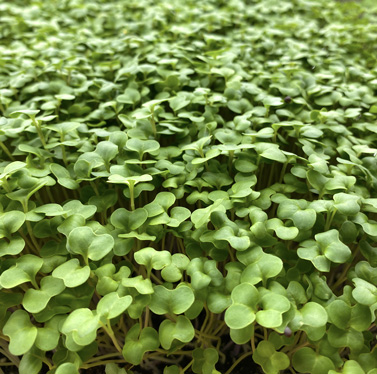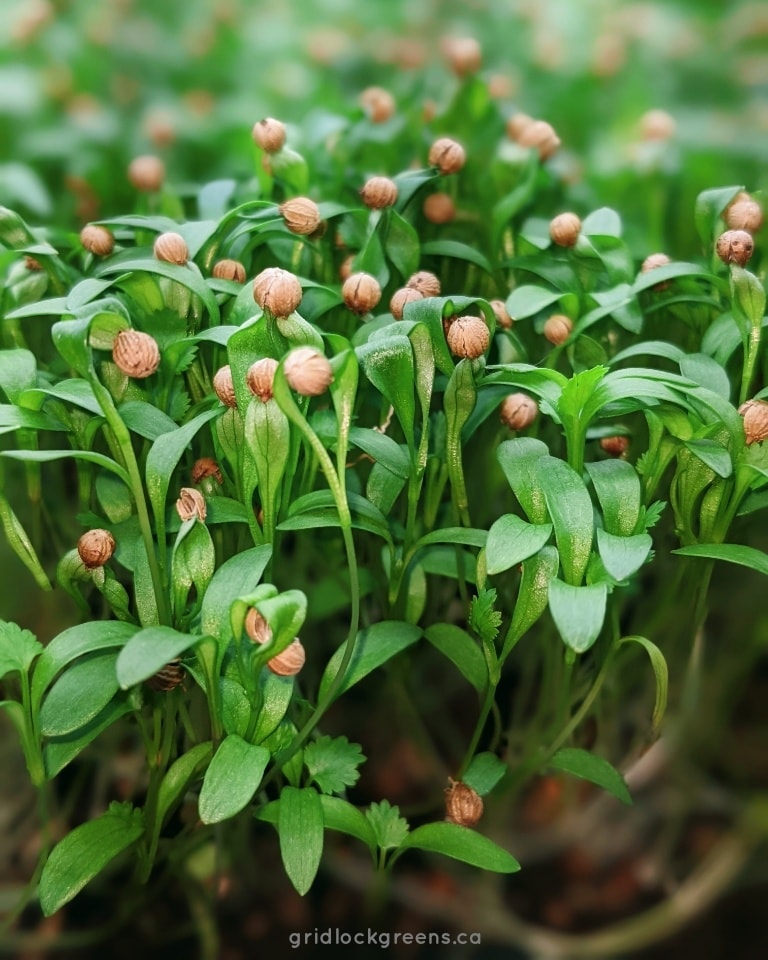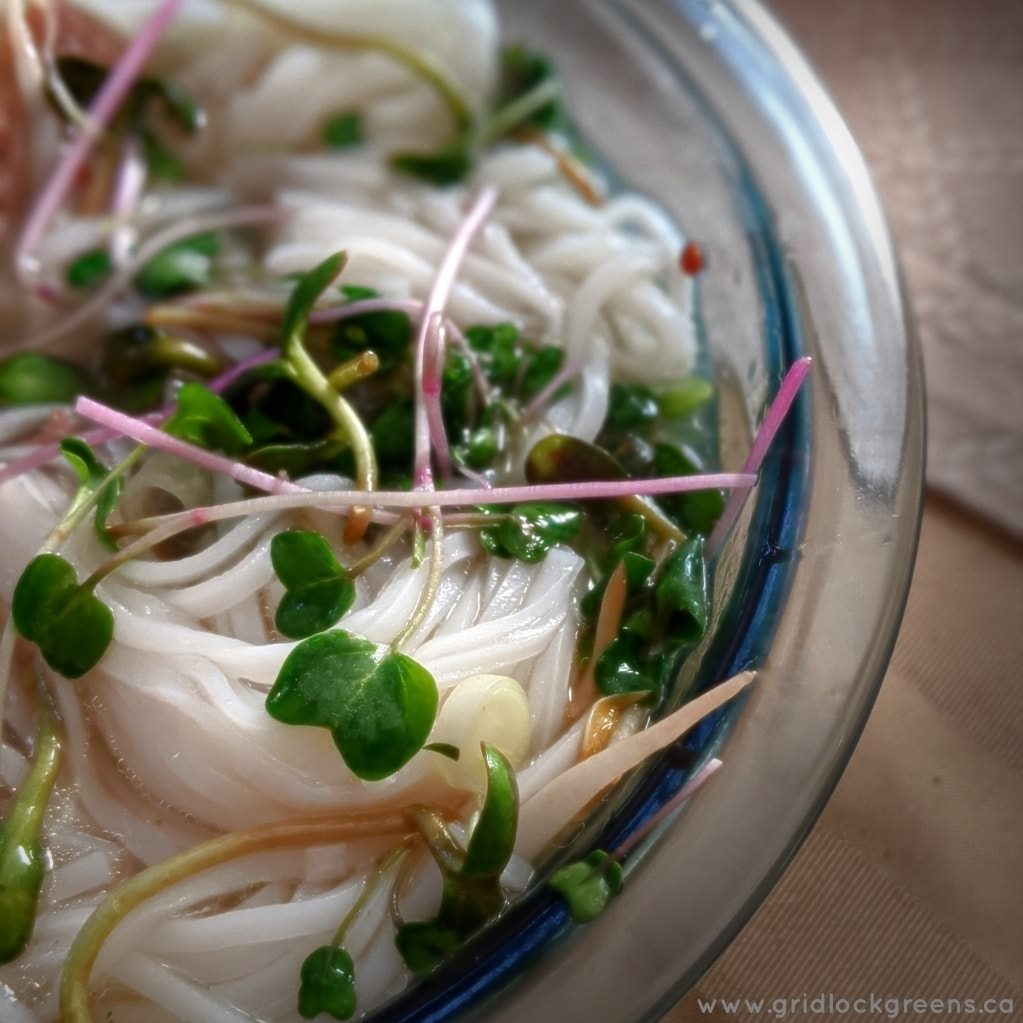What Are Microgreens? *Version en français
Microgreens are young vegetable greens that are approximately 1–3 inches (2.5–7.5 cm) tall. Microgreens are considered baby plants, somewhere between a sprout and baby green, and are harvested just after the cotyledon leaves have developed.

- A great source of high amounts of vitamins, minerals and beneficial plant compounds like antioxidants
- Studies(1) have shown that microgreens are packed with nutrients, most varieties tend to be rich in potassium, iron, zinc, magnesium and copper, vitamins such as C, E, and K, lutein, and beta-carotene, sometimes 40x more than the mature versions of the same plants.(2)
- Microgreens are a rich source of polyphenols, a class of antioxidants linked to a lower risk of heart disease that also may lower the risk of Alzheimer’s disease, various types of Cancer, and bring down triglyceride and “bad” LDL cholesterol levels
- Microgreens have a High Fiber content, promoting good Digestive Health
What do Microgreens taste like and how do i use them?
Microgreens have many types of flavour ranging from spicy, citrus, sour, sweet, or even bitter, a quite intense flavour, strong and concentrated.
*There are many ways to include microgreens in your diet*
- Add fresh in Salads, Sandwiches, Wraps
- Blended in Smoothies
- As Fresh Healthy Snacks, plain or with a dressing/dipping sauce
- Sprinkle on Pizza, Burgers, Omelettes, Curries
- Add to cooked Soups, Mashed Potatoes, Casseroles, Stews, Sauces
- Chopped in Marinades and Rubs
- Blended to make different kinds of Pestos, Sauces, Spreads
![]()
Les Micropousses sont de jeunes légumes verts d'une hauteur d'environ 1 à 3 pouces (2,5 à 7,5 cm). Les Micropousses sont considérés comme de jeunes plantes, quelque part entre une pousse et un semis, et sont récoltés juste après le développement des feuilles de cotylédons.

- Une excellente source d`une grande variete de vitamines, de minéraux et de composés végétaux bénéfiques comme les Antioxydants
- Des études (1) ont demontré que les micropousses regorgent de nutriments. La plupart des variétés ont tendance à être riches en potassium, en fer, en zinc, en magnésium ,en cuivre, en vitamines telles que C, E et K, en lutéine et en bêta-carotène, parfois 40 fois plus que les versions adultes des mêmes plantes.(2)
- Les micropousses sont une riche source de polyphénols, une classe d'antioxydants liés à un risque plus faible de maladie cardiaque qui peut également réduire le risque de maladie d'Alzheimer, de divers types de cancer et de faire baisser les taux de triglycérides et de «mauvais» cholestérol LDL
- Les micropousses ont une teneur élevée en fibres, favorisant une bonne santé digestive
Quel goût ont les Micropousses et comment les utiliser?
Les micropousses ont de nombreux types de saveurs généralement assez fortes, intense, et concentrées. C`es saveurs passent dùne bouquet dàgrumes ou d'épices, à un goût aigre, sucré ou amer.
*Il existe de nombreuses façons d'inclure les micropousses dans votre alimentation*
- Ajouté frais dans les Salades, les Sandwichs, les Wraps
- Mélangé dans des Smoothies
- Comme Collations saines et fraîches, Nature ou avec une Vinaigrette ou une Sauce
- Saupoudré sur Pizza, Hamburgers, Omelettes, Currys
- Ajouté aux mets cuits- Soupes , Purée de Pommes de Terre, Casseroles, Ragoûts, Sauces
- Haché en Marinades
- Mélangé pour fabriquer différents types de Pestos, Sauces, Tartinades
![]()
Unlocking a Nutritional Powerhouse: Exploring the Health Benefits of Microgreens
In recent years, microgreens have emerged as a culinary trend and a powerhouse of nutrition. These tiny greens, harvested at the cotyledon stage, are exploding with flavor and packed with essential nutrients. But what exactly makes microgreens so special, and what health benefits do they offer? Let's talk about these miniature marvels.
Nutrient Density: Small Size, Big Impact
Despite their tiny stature, microgreens are dense with essential vitamins, minerals, and antioxidants. Studies have shown that microgreens often contain higher concentrations of nutrients compared to their mature counterparts. For example, research published in the Journal of Agricultural and Food Chemistry found that certain microgreens, such as red cabbage and cilantro, boast significantly higher levels of vitamins C, E, and K, as well as beta-carotene, compared to their fully grown counterparts.

Antioxidant Powerhouse
Microgreens are rich in antioxidants, compounds that help protect the body from oxidative stress and inflammation. Antioxidants play a crucial role in maintaining overall health and reducing the risk of chronic diseases such as heart disease, cancer, and diabetes. Varieties like broccoli, kale, and radish are well known for their potent antioxidant properties, making them valuable additions to any diet.
Heart-Healthy Nutrients
Several studies have highlighted the cardiovascular benefits of consuming microgreens regularly. Certain varieties, such as broccoli and fenugreek microgreens, contain compounds like sulforaphane and fenugreek galactomannan, which have been shown to lower cholesterol levels, reduce inflammation, and support heart health. Incorporating these greens into your diet may help promote cardiovascular wellness and reduce the risk of heart disease.

Digestive Health Support
Microgreens are rich in dietary fiber, which plays a crucial role in digestive health. Fiber helps regulate bowel movements, prevent constipation, and support a healthy gut microbiome. Additionally, microgreens contain enzymes that aid in digestion, making them easier for the body to absorb and utilize nutrients. Varieties such as broccoli, arugula, and radish microgreens are particularly beneficial for promoting digestive wellness.
Immune-Boosting Properties
With their high concentration of vitamins, minerals, and phytonutrients, microgreens can help strengthen the immune system and ward off illness. Vitamin C, found abundantly in microgreens like kale and mustard, is essential for immune function and may help reduce the duration and severity of colds and flu. Incorporating a variety of microgreens into your diet can provide a natural boost to your body's defenses.
In Conclusion
Microgreens may be small in size, but they pack a nutritional punch that far outweighs their stature. From antioxidant-rich kale to heart-healthy broccoli, these miniature greens offer a myriad of health benefits that can support overall wellness and vitality. Whether tossed into salads, blended into smoothies, or used as a garnish for culinary creations, microgreens are a delicious and nutritious addition to any diet. So why not give your health a boost and start incorporating these nutrient-packed greens into your meals today?
Discover the vibrant world of microgreens and unlock their full potential for health and vitality. Your body will thank you for it!
